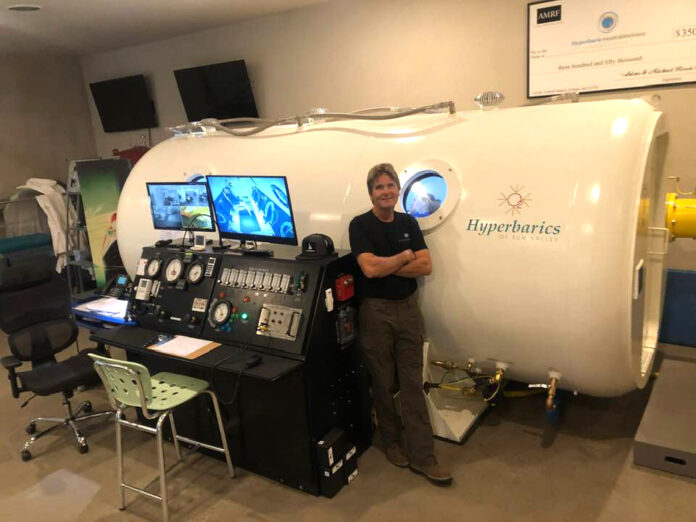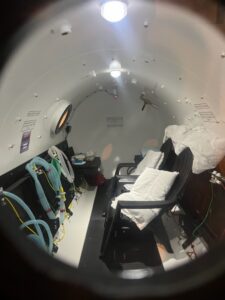
Phil Rainey’s hyperbaric approach
BY ISAIAH FRIZZELL
It’s election time!

And it’s also ‘Spooky Season!’ As the children masquerade in costumes from ghoulish to gorgeous seeking sweet treats and silly scares, voting-age adults are hedging their concerns and hitting the polls to elect representatives in the faith of securing the future of their families and community.
Of the many issues we face, the most sensitive are those involving our children. It is incumbent upon us to teach our children the ways of peacefully addressing the human condition. Children are the future — of the community, the nation and, most immediately, of the family. And what is more family than Idaho? Maybe Idaho, USA — our homeland. This bipartisan issue concerns the community as well as the nation as a whole.
And Then There Were Two
A fresh trustee in Blaine County School District Zone 3 foretells a chance to make a change in the landscape of public schooling. Initially, there were three –—Linn Kincannon, Nora Luz Roebuck and Phil Rainey. Linn withdrew and then there were two.
Nora Luz Roebuck
Hailing from Lima, Peru, preschool teacher at Big Wood School in Ketchum, Nora Luz Roebuck has lived in Idaho for 23 years, five of which she’s taught at Big Wood School. “The mission of Big Wood School is to provide a quality, well-rounded education, promote the development of social skills, and create an environment for the teaching of Christian values and practices.” – Big Wood School (http://www.pcbw.org/programs-classes)
Nora interacts with the children from an early age. “Most kids know me as Ms. NONO,” and while she has her eye on a seat on the school board, she also seeks to work in counseling. Nora was unavailable for comment.
Phil Rainey
Phil Rainey is a multigenerational Idaho resident with a long history of community cohesion: Phil’s great-grandmother was born in Sun Valley; his grandparents went to Hailey High School. While he moved around as a child, he was able to attend several high schools and encounter their culture, from unmentionable to outstanding. Later, he and his brothers returned to Idaho, logging above Anderson [Ranch Dam] in the Boise National Forest in 1977. Needless to say, Phil’s been here for some time watching Idaho grow and evolve.
Phil served in the Navy for 11 years, as a firefighter, and currently aids the community with his Hyperbaric Health & Wellness Foundation in Hailey. Phil brings a unique perspective to what is being called a crisis in public schooling.
What Happened at School?
When new policy swapped teacher accountability from enrollment to attendance, things changed. In Phil’s words they “monetized the students.” In part, this means that instead of using enrollment as a metric, the student’s attendance is now what counts. OK, but what does that really mean? It means, for the teacher, they have to keep seats filled. For the student, it means straight A’s or D’s hold less merit; now it’s whether or not they show up that ensures a completed year.
This is a multi-faceted kludge gluing the arbitrary to the actual. Teachers are paid according to their attendance rates. The students pass or fail according to their attendance rates. How does this help the students? Should the degree to which the kids grow in education and mental agility determine success more than how often they show up? What does this entail when a student is ill, injured or needs prolonged absence? Are actual academic achievements overshadowed by whether they were in the seat an arbitrary number of days? There are no easy answers here as attendance is certainly important and varies with each student’s degree of assiduous nature as to whether it impacts their grades.
Adding to that, the teachers are in performance mode — in how they keep these kids in the classroom. And that makes some sense; they’re not helming the classroom to express themselves and their personal beliefs, they’re teaching a curriculum devised to guide the youth toward making beneficial life decisions that will ultimately serve to create prosperous communities. This demands of the teacher a disciplined blend of personality and professionalism. Teachers are in a real quandary, as well. How do they deal with a curriculum that asks them to step out of a professional role or incites student complaints?
Curriculum Controversy
Curriculum and the academic environment has changed rapidly and dramatically across the nation to include information and instruction that has proven controversial to parents and children alike. Example: Idaho federal legislation passed on Thursday, Oct. 12, 2023, designating bathrooms for use only by those according to their assigned sex. To many, this is controversial.
Subjects and environments outside the realm of academics are being injected into academia. Many of these subjects are historically and ethically taught by parents when the child is deemed by parents of appropriate age and maturity level. That these subjects are now being introduced into public schooling has led, along with things like more disposable income, shifts in focus toward deeper awareness of academic environment wrought by the lockdowns, multimedia propaganda and top-down pressure to a rise in parents with means to consider alternatives to public schooling. If families with the income to take their children out of public school do so, and teachers are let go, where does that leave the underprivileged? This competition comes in many forms — home schooling, private schooling, specialty schooling or even unschooling. What happens to the latchkey kid?
One of the major impediments to the public school system’s cohesive functioning with the needs of the students is communication. During COVID lockdowns, public access to the school board was stopped and instead a system divised where any comments or complaints were to be emailed and addressed… when possible.
Phil has expressed deep concern over this lack of a direct communication channel between the public and their children’s academic environment. How many emails are reasonable to address? For that matter, how many parental concerns are reasonable to address? There are no easy answers but with a business mind and a service-oriented heart, Phil’s approach is to bring these concerns about the changing curriculum, policy and communication routing to the forefront of the discussion at the board.
The Howl of It
“We should be teaching our kids how to think, not what to think… that’s the parents’ job,” says Rainey. Phil has spent a lifetime sourcing answers to problems in Idaho and as he sees the public school system, a tax-funded public good, being run like a tax-funded quasi-business with clear competition, it stokes the fire in him as a successful wellness business owner to take responsibility. “I may not like going into a burning building, but it’s my moral obligation to do my best to help them…” Phil was a firefighter long enough to know what it takes and, in his own words, “There’s no easy answers to these questions but we have to look out for the children, they’re our future.”
What would a savvy, business-minded approach to a service that is quietly being run into the ground look like? Phil has saved lives for years now, including that of his own wife, with his Hyperbaric Wellness Foundation chambers breathing life into the Blaine County community. Phil Rainey knows oxygen feeds fire but it’s the fire of life he wants to feed, the life of communication at the school board, thus the communication of life to the children.
Phil expresses a well-rounded blend or, perhaps, a hyperbaric, systematic approach. “On the fire department, after a large incident, we have an after-incident review. It’s not a time for us to sit around and pat each other on the back for what a great job we did, but a time to take a hard look at our performance, and figure out where our shortcomings are and what we can do better the next time around. We all take ownership of our part. It’s not easy to do but it’s essential for every one of us to take extreme ownership, so that we can become better as a whole.
“I’d like to bring that to the school board and the administration. It’s a way we can collectively improve on the system as a whole.”
The election is November 2. What degree of change would you like to see?


